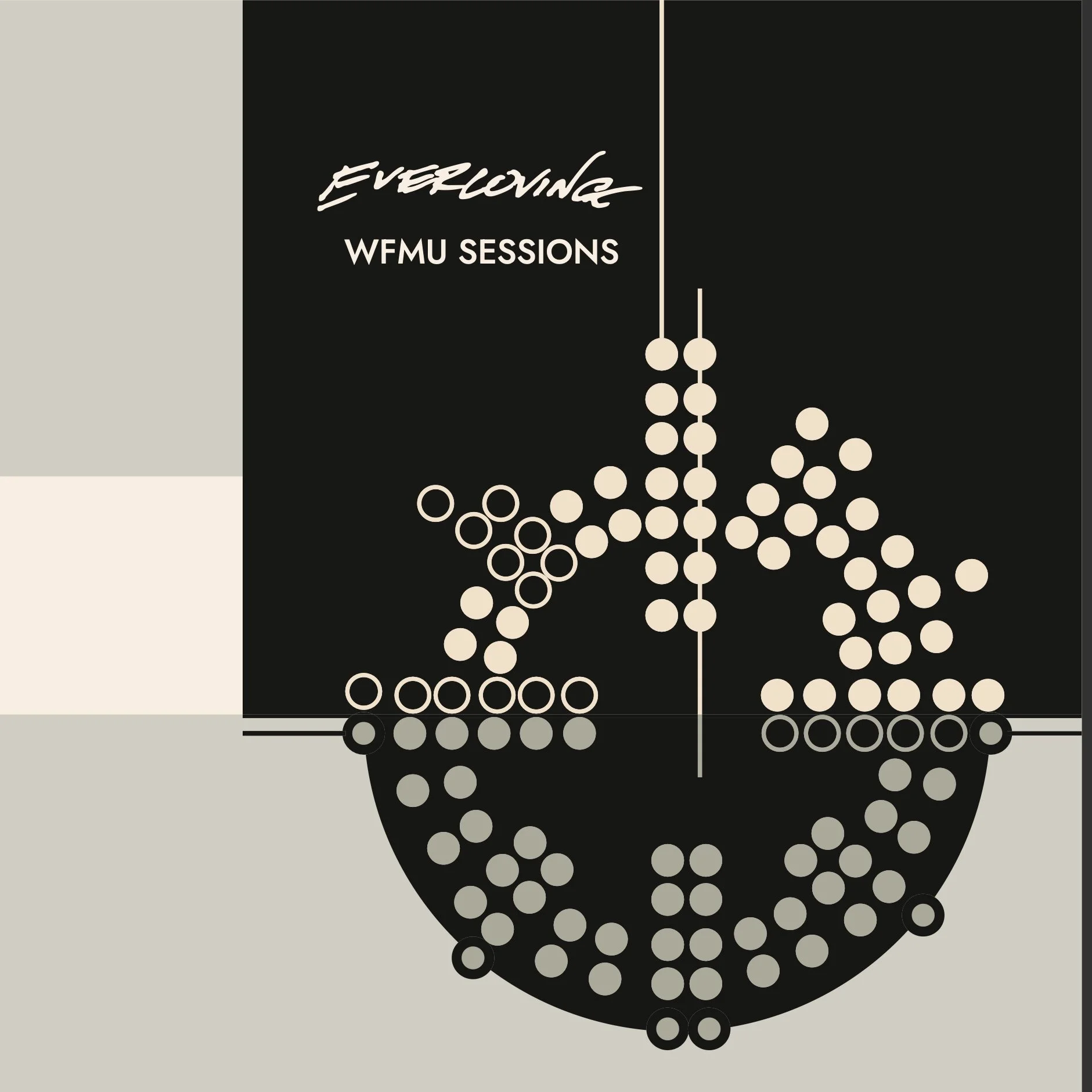EVERLOVING
WFMU Sessions
“DEMOLISH SERIOUS CULTURE!”
Thus, at the dawn of the 1960s, Henry Flynt demanded that “institutional amusement activities” be superseded by what he called “veramusement” and “brend”—neologisms demanding pure recreation. Flynt loathed codified culture and instead celebrated outsider languages that resonated beyond and above academic norms and official sanctions.
Flynt minted the term “concept art” within La Monte Young’s 1961 An Anthology, the proto-document of Fluxus. Beyond a terse association with that movement (his self-described “publisher of last resort”), Flynt actualized his anti-art stance by picketing Lincoln Center, MoMA, and other high-culture citadels in 1962 alongside Harvard classmate Tony Conrad and the protean filmmaker Jack Smith. By 1966, his provocations materialized in song. Like Conrad, he performed with sculptor Walter De Maria and a young Lou Reed; he was tutored by the latter to substitute briefly for John Cale in the Velvet Underground. However, Flynt’s hybridized sounds drilled red-hot through contrarian pop stylings and erupted above classifications.
• • • • •
“Flynt's avant-garde hillbilly music comes across as a movement consisting of a single practitioner; it is, and it isn't social music. In particular, his exuberant solo fiddle tunes such as ‘White Lightning’ and ‘Informal Hillbilly Jive’ cry out for accompaniment, for some kind of musical response to drive their headlong tempos toward even greater abandon.”
— David Grubbs, Records Ruin the Landscape
• • • • •
True. Within Henry Flynt’s sound lurks the ache of the unobtainable but also an implicit challenge. It's a call to action that a combative “supergroup” now accepts. Everloving extends Flynt’s radical reconfiguration of Southern vernacular in a spirit of affirmation and exaltation. However, this is no mere tribute act in which the covers smother. In the ebullient hustle of Everloving , the hot fuss ’n’ bother of yesteryear is churned at a vigorous 45 RPM to a jukebox-lubricating essence.
The careers of these various artists unwind with kudzu-tendriled resolve. Organizer Jonathan Kane demonstrates that the blues are a primal force of cyclical regeneration and reimagination. Like Flynt before him, he promulgates the physicality and spirit of the idiom in irony-free romps that have energized 20th-century minimalism via collaborations with La Monte Young, Rhys Chatham, and Swans. Peter Kerlin and Jim McHugh (like Flynt, a native of Greensboro, NC) fueled Sunwatchers, whose anarchic psychedelia trampled various barricades with abandon. They blasted roiling, harmolodic euphoria for fifteen years, ascending on a cloud of freewheeling madness; Meredith McHugh’s Smoke Bellow wafted to similar heights.
David Sulzer is a neuroscientist whose laboratory has made crucial contributions to studying brain mechanisms and their involvement with autism, Parkinson’s, learning, and memory; he is also the composer and performer Dave Soldier. As founder of the chamber-punk Soldier String Quartet, he has renounced classicism in collaborations with Guided By Voices, author Kurt Vonnegut, and Talking Heads’ David Byrne; for six years, he toured as band leader and musical arranger for John Cale. In locales ranging from Thailand and Guatemala to East Harlem, he has coached untrained schoolchildren and animals - the Thai Elephant Orchestra - in free-form musical expressions of agency and self-determination.
Also audible are the echoes of Soldier and Kane’s 1990s Delta-punk ensemble, the Kropotkins, whose participants included riot cowgrrrl Lorette Velvette, violinist Charles Burnham (James “Blood” Ulmer’s Odyssey), and Velvet Underground drummer Moe Tucker. (Will this label’s interlacings with the VU ever cease?) Similarly, Everloving expands Flynt’s take on “The Internationale,” which he had repositioned from an apparatchik pledge to a country blues style via a dour theme recorded in the 1920s by Dock Boggs.
Of his mid-70s recordings, Flynt acknowledged, “I would’ve tried to turn it into a legitimate country rock band that had a lot of songs and a few instrumentals in the repertoire. That was the goal. It didn’t happen. I also wanted to have flexible musicians…to have a country rock band with the ability to play funk, to play this and that, to move freely among many different Southern roots styles.”
Everloving realizes that intent within a crucible of agency that our tumultuous era demands. Here is a triumphant singalong and a clangorous Huzzah! from a like-minded gathering of pickers, fiddlers, and tub-thumpers who reject designations, ossifications, and highfalutin encapsulations. Sixty-odd years after Henry Flynt’s first solo defiances, Everloving volunteers accompaniment, camaraderie, and a low-down, hoedown abandon that stomps the sawdust to win the prize.
• • • • •
Henry Flynt:
“Ecstatic, ragged work ... intensely amplified to emphasize keening, throbbing overtones … Over a trance-inducing tambura drone, Flynt fashioned lines that swooped and soared, dipped and glided, his tone at times exploding into coarse grain or glistening shards. This was, in a word, transcendent: a tour de force of selfless intensity and aural bliss, sustained for close to 30 minutes.”
— Steve Smith, Introducing Tony Conrad: A Retrospective
Jonathan Kane:
“Paradise between the back porch, the urban jungle and the heavens above ... The album’s down-home grooves shine with an orchestral, massed-guitar luster that's often associated with Glenn Branca and Kane’s frequent collaborator Rhys Chatham. Layered electric and acoustic sounds create overtones that trick the listener into hearing nonexistent organs and harmonicas. In place of the mind-boggling beats for which he's known, Kane underpins these drones with a deceptively simple, forcefully executed shuffle. His swinging opuses exude bright, earthy euphoniousness instead of dark, cerebral dissonance: Witness the rollicking ‘Sis’ or the luminous version of the traditional ‘Motherless Child.’ Rarely does the avant-garde rock this hard."
—Time Out New York
“As co-founder of Swans and a volcanic drummer behind such notables as Rhys Chatham and La Monte Young, Jonathan Kane has provided the rhythmic foundation for several classic Downtown NYC landmarks. His music's intrinsic swagger is crucial … he side-steps cliché by marshaling his minimalist riffs to their trance-inducing limits, and deftly sparks a synaptic link between Neu!-style repetition and the hypnotic electric blues of Junior Kimbrough.”
—Pitchfork
"[Table of the Elements] has a livewire in drummer Jonathan Kane, whose CD February represents thrilling possibilities for its future. The music's tintinnabulatory rush is hypnotic and bracing, an evocation of the blues that harks backwards and forwards at once. It's the kind of music men might gather to play on a moonlit night deep in some rural hill country, with trouble in the distance and whiskey close at hand. It's the kind of music you might hear above a bodega, on an afternoon in the Lower East Side, with trouble everywhere and no end in sight. It's the kind of music Table of the Elements is all about."
— Steve Dollar
Jonathan Kane with La Monte Young:
“You can hear the same blue-note pitch swerves that have been the poetry in motion of guitarists from Son House to Jimi Hendrix. The locomotive chug of Young's playing also swells with the Chicago rent-party exuberance of Jimmy Yancey and Little Richard's barrelhouse hammering."
— Rolling Stone
Sunwatchers:
“... Recalls a cultural heyday in the 1960s and 1970s, when raucous instrumental sounds, particularly the free jazz that Archie Shepp called ‘Fire Music,’ were key to a sociopolitical groundswell that sought uprising through artistic engagement. (Sunwatchers took their name from a song by one of the most boundary-pushing artists of the time, Albert Ayler.) But Sunwatchers’ music isn’t exactly a treatise; it’s as rough and primal as it is aware. Still, a historical strain of rebellion radiates through [the] best moments, and they’re hell-bent on carrying it forward. That goal now feels more urgent and purposeful than ever before.”
— Pitchfork
“This is a powerful record. It is brainy and brawny, full of intricate moments and massive riffs, working together in some strange and enchanting symmetry to make beauty out of madness. What a delight.”
— Post Trash
“Music Is Victory Over Time, like so much of the Sunwatchers catalog, creates the mindset in which revolutionary impulses and ideas can flourish—one driven by patience and passion in equal measure. Their music is a leaderless, collective shout of defiance, each element working in tandem to rethink how music moves and how it moves the listener.”
— Pitchfork
Dave Soldier:
“Soldier is of two minds. As a composer and violinist, he doesn’t like to define music too strictly. He prefers to mix genres, blur categories, erase the boundaries between rock and classical, melody and noise, animal and human. He has composed string arrangements for David Byrne and John Cale, operas with Kurt Vonnegut, and cartoon scores for Sesame Street. To Soldier, it’s all of a piece. Once, in the same week, he played a gig with Pete Seeger and opened for Ornette Coleman. ‘It was like talking to the same person.’”
— The New Yorker
February Meets Soldier String Quartet:
“The four lengthy pieces … explore the mesmerizing intersections of the two outfits via those of the blues and contemporary minimalism, the music’s steady percussion, droning strings, and repetitive guitar figures interlocking hypnotically like the inner workings of a precision pocket watch. One minute into the entrancing, Can-esque opener ‘Hate to See You Go,’ and you won’t want this disc to end.”
— Chronogram Magazine
Everloving
WFMU Sessions
2025
Table of the Elements
[Oganesson] 116
EOE-000
Phono 12” LP + 7” single, 180g vinyl, gatefold jacket, booklet



